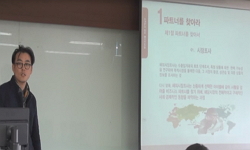On 23 May 2022, the Indo-Pacific Economic Framework for Prosperity (IPEF) was launched. IPEF aims to advance resilience, sustainability, inclusiveness, economic growth, fairness, and competitiveness for the 14 IPEF partners. IPEF also will provide tan...
http://chineseinput.net/에서 pinyin(병음)방식으로 중국어를 변환할 수 있습니다.
변환된 중국어를 복사하여 사용하시면 됩니다.
- 中文 을 입력하시려면 zhongwen을 입력하시고 space를누르시면됩니다.
- 北京 을 입력하시려면 beijing을 입력하시고 space를 누르시면 됩니다.

글로벌 공급망 위기와 재편에서 IPEF 공급망 협정의 주요 내용과 전략적 의의 분석 = Global Supply Chain Crisis and the IPEF Supply Chain Agreement
한글로보기부가정보
다국어 초록 (Multilingual Abstract)
IPEF includes Pillar I (Trade), II (Supply Chains), III (Clean Economy), and IV (Fair Economy). On 27 May 2023, Ministers of the 14 IPEF countries announced the substantial conclusion of negotiations on Pillar II (Supply Chains), and on 7 September 2023, the text of the IPEF Supply Chain Agreement was published. The IPEF Supply Chain Agreement aims to increase the resilience, efficiency, productivity, sustainability, transparency, diversification, security, fairness, and inclusivity of their supply chains through both collaborative activities and individual actions taken by each IPEF partner.
The Supply Chain Agreement is designed to enable IPEF partners to work together collaboratively to make supply chains more resilient, efficient, transparent, diversified, secure, and inclusive, including through information exchange, sharing of best practices, business matchmaking, collective response to disruptions, and supporting labor rights. It is also designed to facilitate a reliable supply of critical goods during a time of crisis.
On 23 May 2022, the Indo-Pacific Economic Framework for Prosperity (IPEF) was launched. IPEF aims to advance resilience, sustainability, inclusiveness, economic growth, fairness, and competitiveness for the 14 IPEF partners. IPEF also will provide tangible benefits that fuel economic activity and investment, promote sustainable and inclusive economic growth, and benefit workers and consumers across the region.
IPEF includes Pillar I (Trade), II (Supply Chains), III (Clean Economy), and IV (Fair Economy). On 27 May 2023, Ministers of the 14 IPEF countries announced the substantial conclusion of negotiations on Pillar II (Supply Chains), and on 7 September 2023, the text of the IPEF Supply Chain Agreement was published. The IPEF Supply Chain Agreement aims to increase the resilience, efficiency, productivity, sustainability, transparency, diversification, security, fairness, and inclusivity of their supply chains through both collaborative activities and individual actions taken by each IPEF partner.
The Supply Chain Agreement is designed to enable IPEF partners to work together collaboratively to make supply chains more resilient, efficient, transparent, diversified, secure, and inclusive, including through information exchange, sharing of best practices, business matchmaking, collective response to disruptions, and supporting labor rights. It is also designed to facilitate a reliable supply of critical goods during a time of crisis.
참고문헌 (Reference)
1 강유덕, "미국과 유럽연합(EU)의 공급망 복원력 강화 정책과 패러다임에 관한 비교연구: 인플레이션감축법(IRA)과 핵심원자재법(CRMA)의 사례" EU연구소 (67) : 257-290, 2023
2 김제영 ; 이현재 ; 김민정, "미국 인플레이션 감축법(IRA)의 통상법 쟁점 연구 - 청정자동차 세액공제 규정을 중심으로 -" 무역구제학회 (67) : 71-100, 2023
3 김종권, "IPEF를 통한 협력증진과 한국 무역확대관계의 연구" 한국무역연구원 19 (19): 259-276, 2023
4 김수동, "IPEF 협상의 필러별 주요 의제와 세부 조항 검토" 산업통상자원부 2022
5 안상욱, "EU의 핵심광물 공급망 안정성 확보 정책" 한국유럽학회 41 (41): 191-213, 2023
6 안상욱, "EU와 주요 EU회원국의 배터리 공급망 정책의 차이점: 대중국 전략" 한국유럽학회 41 (41): 59-78, 2023
7 The White House, "Building Resilient Supply Chains, Revitalizing AmericanManufacturing, and Fostering Broad-Based Growth"
1 강유덕, "미국과 유럽연합(EU)의 공급망 복원력 강화 정책과 패러다임에 관한 비교연구: 인플레이션감축법(IRA)과 핵심원자재법(CRMA)의 사례" EU연구소 (67) : 257-290, 2023
2 김제영 ; 이현재 ; 김민정, "미국 인플레이션 감축법(IRA)의 통상법 쟁점 연구 - 청정자동차 세액공제 규정을 중심으로 -" 무역구제학회 (67) : 71-100, 2023
3 김종권, "IPEF를 통한 협력증진과 한국 무역확대관계의 연구" 한국무역연구원 19 (19): 259-276, 2023
4 김수동, "IPEF 협상의 필러별 주요 의제와 세부 조항 검토" 산업통상자원부 2022
5 안상욱, "EU의 핵심광물 공급망 안정성 확보 정책" 한국유럽학회 41 (41): 191-213, 2023
6 안상욱, "EU와 주요 EU회원국의 배터리 공급망 정책의 차이점: 대중국 전략" 한국유럽학회 41 (41): 59-78, 2023
7 The White House, "Building Resilient Supply Chains, Revitalizing AmericanManufacturing, and Fostering Broad-Based Growth"
동일학술지(권/호) 다른 논문
-
영국 2015년 보험법 상 사기적인 보험금청구에 대한 구제수단에 관한 연구
- 한국무역상무학회
- 신건훈
- 2023
- KCI등재
-
- 한국무역상무학회
- 박광서
- 2023
- KCI등재
-
- 한국무역상무학회
- 최두원
- 2023
- KCI등재
-
「무역상무연구」 국제운송·보험·물류 분야 게재 논문 메타분석
- 한국무역상무학회
- 양정호
- 2023
- KCI등재




 DBpia
DBpia






